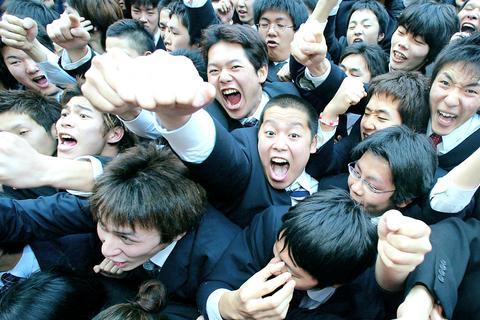Nanae Okubo was "inspired." Shunta Taka-yama was "waaaah, all fired up."
The heady mixture of pompom-waving cheerleaders, chants drawn from ancient warrior purification rituals, drummers, a brass band and ear-splitting rock music had gotten the two 19-year-old Tokyo students psyched up for their coming challenge.
They are about to start looking for work.

PHOTO: AP
The two were among some 3,000 students from business and technology colleges who filled an outdoor auditorium in a central Tokyo park earlier this week for an event aimed at giving them a rousing send-off on their journey into the corporate world.
Crowding the stage and screaming at the cheerleaders, the students, identically clad in severe grey suits, weren't behaving like the salarymen and women of tomorrow, even if they looked like them.
But their exuberance masks a serious reality.
Times are tough for young workers in Japan. Unemployment in the 15-24 age group is 10 percent, twice the overall rate and double what it was 10 years ago.
Japan's decade-long slowdown has pushed the unemployment rate up to record highs as companies cut costs by shedding older workers, closing subsidiaries and holding off on new hires.
"Listening to older students I realize that things are getting more difficult each year," Okubo said, struggling to make herself heard over the brass band's rendition of Frankie Valli's Can't take my eyes off you.
With a recovery gathering steam, there are signs that employment conditions are getting better, with more jobs available. But the slowdown has left a legacy of problems for the economy.
Fewer young workers means less tax income and welfare payments to boost falling government revenues and prop up the ailing pension and health systems needed to cope with Japan's rapidly aging society.
In addition, poor prospects and a more individualistic outlook on life have seen some 4 million young people opt for a life of casual job-hopping, more than double the number 10 years ago.
This has raised government concern about whether Japan will have enough skilled workers to maintain its industrial productivity, a problem that some say will take more than an economic recovery to sort out.
"The worrying aspect is the skill mismatch angle," said Richard Jerram, chief economist at ING Securities.
"Job vacancies are running at record levels, generally in highly value-added manufacturing and information services," he said.
"It appears that many young people may have spent their university years playing Game Boy but they are not qualified as IT engineers."
Remedying this, he said would mean taking a look at the education system, which may be too generalist.
However, the government may take some heart from the positive approach of Okubo, Takayama and several other students who took time away from the fun and games to talk about their prospects.
All were aware of how difficult the challenge was, but none was interested in the casual labor route.
"I don't think it's bad for people to become casual workers, if they are working toward some dream of their own," said Takayama.
"But I want a regular job," he said.
Takeo Ariga, a goatee-sporting 21-year-old would-be public official, said people shouldn't just blame the economy.
"High school students are too superficial when they think about work. They need to think more seriously."

The CIA has a message for Chinese government officials worried about their place in Chinese President Xi Jinping’s (習近平) government: Come work with us. The agency released two Mandarin-language videos on social media on Thursday inviting disgruntled officials to contact the CIA. The recruitment videos posted on YouTube and X racked up more than 5 million views combined in their first day. The outreach comes as CIA Director John Ratcliffe has vowed to boost the agency’s use of intelligence from human sources and its focus on China, which has recently targeted US officials with its own espionage operations. The videos are “aimed at

STEADFAST FRIEND: The bills encourage increased Taiwan-US engagement and address China’s distortion of UN Resolution 2758 to isolate Taiwan internationally The Presidential Office yesterday thanked the US House of Representatives for unanimously passing two Taiwan-related bills highlighting its solid support for Taiwan’s democracy and global participation, and for deepening bilateral relations. One of the bills, the Taiwan Assurance Implementation Act, requires the US Department of State to periodically review its guidelines for engagement with Taiwan, and report to the US Congress on the guidelines and plans to lift self-imposed limitations on US-Taiwan engagement. The other bill is the Taiwan International Solidarity Act, which clarifies that UN Resolution 2758 does not address the issue of the representation of Taiwan or its people in

DEFENDING DEMOCRACY: Taiwan shares the same values as those that fought in WWII, and nations must unite to halt the expansion of a new authoritarian bloc, Lai said The government yesterday held a commemoration ceremony for Victory in Europe (V-E) Day, joining the rest of the world for the first time to mark the anniversary of the end of World War II in Europe. Taiwan honoring V-E Day signifies “our growing connections with the international community,” President William Lai (賴清德) said at a reception in Taipei on the 80th anniversary of V-E Day. One of the major lessons of World War II is that “authoritarianism and aggression lead only to slaughter, tragedy and greater inequality,” Lai said. Even more importantly, the war also taught people that “those who cherish peace cannot

US Indo-Pacific Commander Admiral Samuel Paparo on Friday expressed concern over the rate at which China is diversifying its military exercises, the Financial Times (FT) reported on Saturday. “The rates of change on the depth and breadth of their exercises is the one non-linear effect that I’ve seen in the last year that wakes me up at night or keeps me up at night,” Paparo was quoted by FT as saying while attending the annual Sedona Forum at the McCain Institute in Arizona. Paparo also expressed concern over the speed with which China was expanding its military. While the US